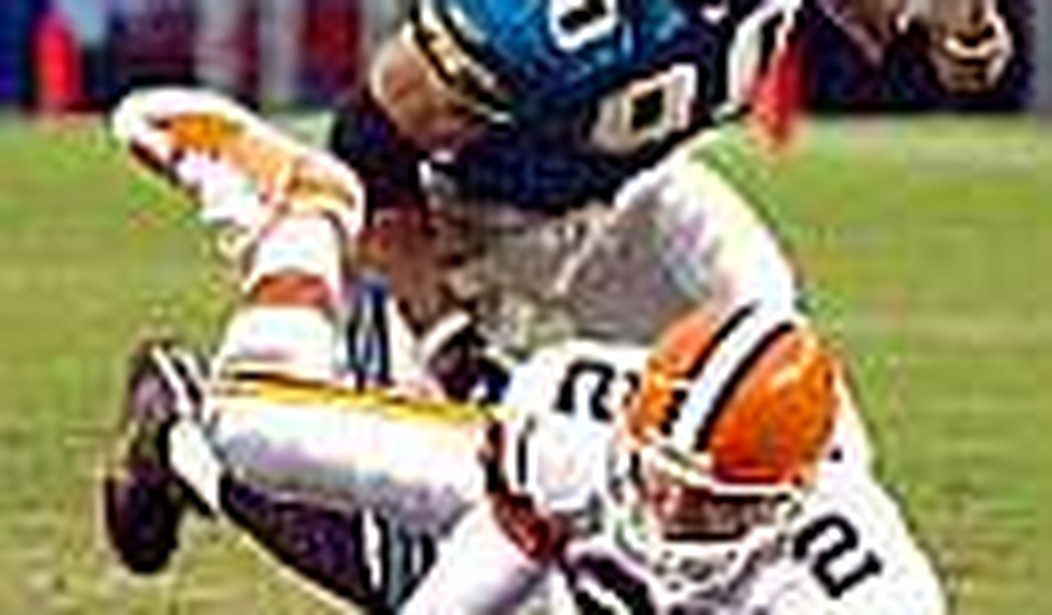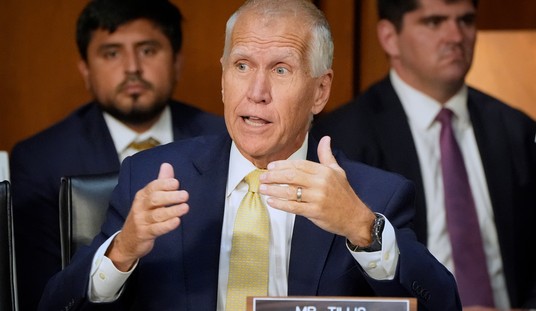Professional football is a violent game that does enormous harm to the human body. And over time, the accumulation of serious injuries, the drugs taken in order to play every Sunday, and the ethos of “playing with pain” that exacerbates injuries all add up to crippling, disabling conditions later in life.
“The NFL players’ union and owners have largely abandoned the players that built the league…”And those lives have proven to be shortened considerably by playing the game at the professional level – especially if you happen to be one of the 500 or so 300-pound linemen who showed up at NFL training camps last year. Studies have shown that these heavier athletes are dying at a worrying rate before they reach the age of 50. And given the push for ever-bigger linemen in college and high school, the problem will only get worse.
But if you ask them, the overwhelming majority of old-timers will tell you that even if they knew before they signed that first professional contract that they would be unable to walk at age 50, or live life without bearing an enormous amount of pain, they would still have gone ahead and played just as hard. All for the love of a game where the average career lasts around 7 years. And only recently have the financial rewards allowed most players to retire in relative ease and comfort.
Not so for those who played in the 50’s, 60’s, and 70’s. The scandalous secret that the NFL wants to keep from the football viewing public is that after giving their all to the game and suffering the consequences of throwing their bodies around the field year in and year out, the NFL players’ union and owners have largely abandoned the players that built the league, forcing them to pay their medical expenses out of pocket. This has impoverished many of them, and started a bitter round of recriminations between today’s players’ union and yesterday’s heroes.
The issue is the disability system set up by the NFL Players Association. A union in name only, interested more in labor peace than in representing the players in a truly meaningful sense. One need only look at free agency in the NFL to determine the health of the union. The nightmare of designations, classifications, and rules that determine a free agent’s status is geared toward inhibiting a player’s movement and keeping salaries as low as possible.
One can become a “restricted” free agent after three years. This means that the player can try to sign with another team if he wishes. But his old team can still claim him by matching the offer made by the other team — thus keeping the player for another year. Rarely, the other team will make such an outrageous offer that the player’s original team will refuse to match it. But this “poison pill” approach rarely occurs because it would start a salary escalation war that no owner wants.
After four years, the player becomes an “unrestricted” free agent. Ah! Freedom at last, right? Not so fast. The player’s team can slap a “Franchise Player” tag on the player and, through a complicated averaging system, pay him less than he would be worth on the open market.
Five years? The player’s team can slap him with the franchise tag again, and would have to pay him considerably more money. But it would still be less than the player could earn in an open market system! Then there are other gimmicks like the “Transition” designation and little games played with the salary cap — all designed to keep as much money in the owner’s pockets as possible.
If you recall my mentioning that the average career of the NFL player is around 7 years, you begin to see the problem. By the time an NFL player is truly free, the clock is ticking on his career and the possibility of serious, career ending injury is an ever-present concern.”Hall of Fame guard Jerry Kramer — considered by many to be the best to ever play the game — gets a grand total of $358 a month in pension benefits.” Since most NFL players do not have contracts that are 100% “guaranteed,” if they’re hurt, the chances are they will receive only a percentage of the monies owed them.
Given the situation with unfree “free agency,” you can imagine what the disability system is like: A nightmare of red tape, rules, and regulations designed to pay as little as possible to those who need it the most. The situation is so bad that a group of former players took their grievances against the players’ union to Congress.
The horror stories that emerged from the hearing before the House Judiciary Committee revealed a system that cries out for serious, substantive reform:
Former NFL players told a sympathetic House Judiciary subcommittee tales of multiple surgeries, dementia, and homelessness. All while trying to fight through the red tape of the National Football League and the NFL Players Association’s disability system.
The league and the players association said pensions are improving and there’s no need for Congress to step in.
Curt Marsh, an Oakland Raider from 1981-87, described a leg amputation, more than 30 surgeries, and multiple doctor visits before he was approved for disability payments. Brent Boyd, a Minnesota Viking from 1980-86, talked about his bouts with homelessness as a single dad, and brain damage he blames on multiple concussions from his football days.
The late Mike Webster, the Hall of Fame Pittsburgh Steelers’ center who suffered from mental illness that was widely attributed to head injuries, died homeless in 2002, his lawyer told the committee.
Prior to that hearing, ex-Bears coach and current ESPN football analyst Mike Ditka got into a verbal sparring match with NFLPA head Gene Upshaw over the disability system. Ditka was saying that with all the money being made, there should be enough to pay the medical expenses of veterans. Upshaw claims that since the pension and disability system is governed by ERISA (Employee Retirement Income Security Act), there is little that can be done to speed benefits to retired players.
And those benefits currently don’t amount to much. Hall of Fame guard Jerry Kramer — considered by many to be the best to ever play the game — gets a grand total of $358 a month in pension benefits. And that’s with last year’s 25% increase.
The league itself is staying out of the fight, seeing the problem as a union issue. But sooner or later, someone is going to have to step up and do something about the problem. And if the NFLPA is unable or unwilling to reform the system, it is possible that Congress may step in and do it for them.
No one wants that. Which is why it’s likely the league will work quietly behind the scenes to get Upshaw off the ball and streamline the claims process so that old time players will be able to get the medical attention they need and deserve as quickly as possible. Whether that will fully satisfy the mercurial Ditka remains to be seen. But it will at least give the old-timers and the NFLPA time to cool their tempers, the display of which generated a lot of bad press for this, the most image conscious of professional sports leagues.
Would it be worth it to you if you couldn’t walk or raise your arm above your waist or if pain racked your body all day every day – all to play a game where your chances of serious injury from just walking on the practice field would give an actuary a heart attack?
It appears that those with a driving passion to play football are willing to take that chance.
Rick Moran blogs at Right Wing Nut House.










Join the conversation as a VIP Member